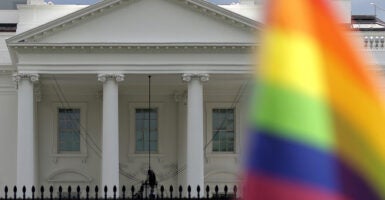President Joe Biden has sought to inject gender ideology into our laws since his first day in office. He might prefer a massive bill like the Equality Act that elevates the categories of “sexual orientation” and “gender identity” to status of race and sex. But that effort has stalled in the Senate. So, for now, his administration is looking for ways to insert sexual orientation and gender identity concepts into existing law.
The latest? In January, the U. S. Department of Health and Human Services proposed a rule that would add sexual orientation and gender identity language to the 2010 Affordable Care Act. According to the department, these amendments will ensure that those who identify as LGBT receive “medically necessary” care. This includes “gender-affirming” surgeries and hormone “therapy.”
In fact, the department’s proposed rule circumvents the law and treats dubious treatments as essential health benefits in qualified health plans. This not only contradicts the best science and medicine, it’s a disaster for insurers, for medical providers, and, most of all, for those struggling with gender dysphoria.
Sex, Gender, and Discrimination
The rule has legal problems, but we shouldn’t allow that to distract us from the fact that it strikes at the heart of what it means to be human. To see this, it helps to keep a few definitions in mind.
First is “sex.” Human beings are a sexually dimorphic species. With the very rare exceptions (such as those resulting from disorders of sexual development, sometimes called “intersex”), everyone is clearly either male or female. This is biology. It’s also common sense—as revealed by the testimony of every culture in every time and place throughout history.
Many people also affirm the sexual binary of male and female on religious grounds. The book of Genesis, for instance, says that God created us “male and female.”
The next term is “gender,” which is best seen as the social and psychological correlate to sex—as sexologist Debra Soh has argued. “Male” and “female” connote sex. “Masculine” and “feminine” connote gender.
Then there’s “gender identity,” which comes from the lexicon of gender ideology. According to one popular definition, gender identity “refers to a person’s understanding and experience of their own gender.”
Note the circularity. Once untethered from biological sex, gender identity can mean almost anything. Hence the current taxonomy of 72 genders—subject, of course, to expansion.
This subtle shift in terms is critical. Behind “gender-affirming care” is the hope of aligning the recipient’s body with his or her gender identity. Such “care,” however, is at best cosmetic. It cannot achieve the impossible: to change someone’s sex with chemicals or scalpels.
The Department of Health and Human Services rule would, in effect, erase a key aspect of our humanity. That is, it would displace biological sex as a criterion for medical care with a fluid and illusory notion of gender identity. This, in turn, would also serve as precedent for further policy changes elsewhere in the administrative state.
Conscience and the Reality of Sex
Despite the infiltration of gender ideology in government bureaucracies, many people still know—on rational, scientific, medical, and/or religious grounds—that sex is immutable. Doctors and government officials, they believe, should recognize sex as a human reality, not treat it like a fashion choice, or, still less, like a tumor that can be surgically removed.
Many insurers, medical professionals, and health insurance enrollees hold such views. And they will want nothing to do with chemical and surgical interventions for the purpose of “gender transition.” The new HHS rule, if approved, would force many medical professionals to violate their medical expertise and religious convictions.
While advocates of the rule claim it will comply with the Religious Freedom Restoration Act of 1993—which severely restricts government interference with religious belief—the rule deems treatments that exclude gender-affirming interventions as “presumptively discriminatory.” But this is bound to conflict with the religious and medical consciences of many people—and, thus, to run afoul of the law.
In any case, views based on reasonable medical, moral, and religious beliefs and the best interests of the patient are nothing like invidious discrimination. The federal government should not treat them as such.
Neither Medically Necessary nor Helpful
But what if, as the proposed rule claims, “clinical evidence supports medically necessary gender affirming care” and shows that such coverage “can significantly improve the health and well-being” of patients?
Proponents claim that gender-affirming care is medically necessary because the presumed alternative to hormones or surgeries is suicide. Thus, the express goal of this so-called care is to improve mental health, and so prevent suicide.
Despite activists’ claims, the clinical evidence shows otherwise. A 2019 study of the largest dataset of patients who have undergone gender-affirming surgeries “demonstrated no advantage of surgery in relation to subsequent mood or anxiety disorder-related health care.” It likewise found no benefits to chemical interventions, such as cross-sex hormones.
The most thorough follow-up study is far more troubling. It reports that those who have undergone gender-affirming surgeries are, after 10 to 15 years, 20 times more likely to commit suicide than are comparable peers.
There are also serious risks for those who receive drugs and surgery for the purpose of gender transition. Puberty blockers lead to decreased bone density and prevent the proper “sex-steroid dependent organization and maturation of the adolescent brain.” Those who use cross-sex hormones have a greater risk of cardiovascular disease, depression, and permanent sterilization, among other things. “Sex-reassignment” surgeries carry even more serious risks that lead to long-term complications and worse mental health.
Misreading Bostock
Despite all these problems with this HHS rule, does the Supreme Court’s 2020 ruling in Bostock v. Clayton County require it?
The Department of Health and Human Services seems to think so. It bases the proposed rule on two other directives. The first, “Preventing and Combating Discrimination on the Basis of Gender Identity or Sexual Orientation,” is an executive order that Biden issued on the first day he took office. The second is the department’s May 10, 2021, notification of enforcement of the same.
In both documents, the administration cites the Supreme Court’s ruling as grounds for expanding the meaning of sex discrimination to include sexual orientation and gender identity. This, however, is a distortion of the court’s reasoning.
According to Justice Neil Gorsuch, the court proceeded “on the assumption that ‘sex’ signified what the employers suggest, referring only to biological distinctions between male and female.”
Gorsuch underscored the narrowness of the ruling by stating that the ruling applied only to Title VII of the Civil Rights Act of 1964, which deals only with matters of employment. He thus anticipated and rebuffed future efforts to apply Bostock to all civil rights regulations.
What’s more, the court stressed that the Religious Freedom Restoration Act serves as a “super statute.” As a result, in many contexts, the act protects actions that might otherwise run afoul of a nondiscrimination rule. In appropriate cases, Gorsuch noted, the act could apply even in employment. Once again, Gorsuch sought to preempt flawed readings of the court’s ruling in Bostock.
The new rule relies on just such a flawed reading. It lacks legal basis to amend the proposed nondiscrimination provisions and contradicts the plain meaning of laws against sex discrimination.
Costly Harm
From its flawed interpretation of Bostock to its faulty medical evidence, this new rule is clearly the result of gender ideology, not solid science and sound reason. If approved, the rule would further undermine evidence-based medical research and health care involving gender dysphoria.
It would force insurers, medical providers, and those enrolled in qualified health plans to pay for and/or perform harmful procedures that, for many of them, would violate their medical expertise and religious convictions. In short, the rule would violate Americans’ basic rights and harm the very people it seeks to help.
Have an opinion about this article? To sound off, please email [email protected] and we’ll consider publishing your edited remarks in our regular “We Hear You” feature. Remember to include the URL or headline of the article plus your name and town and/or state.
































